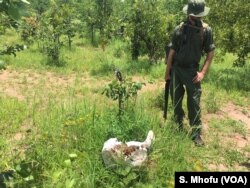An anti-poaching unit operating on the west of Zimbabwe’s Matusadona National Park is reporting no elephants poached for nearly two years. The unit is hoping its vigilance can be copied nationwide and that combined with education efforts it will help stamp out the poaching which risks decimating Zimbabwe’s rich wildlife.
Members of the Bumi Hills anti-poaching unit start their day with drills before they get into the bush looking for poachers. Poachers aim for anything from elephants, to rhinos, to small game for meat. But Nick Milne, the founder and head of the Bumi Hills Foundation, said his anti-poaching unit has been successful.
“We have eliminated elephant poaching completely for nearly two years. March 2015 was the last recorded elephant carcass," he said. "But our area is very small. All we have done is push the problem further afield. We know from our neighboring area that elephant poaching has increased in those areas. So we are in the process at the moment to work with everyone else to try to increase our collaborative efforts. There is a lot being done on the ground but it is fragmented so it is not being effective."
The Great Elephant Census funded by philanthropist Paul Allen about 20 years ago concluded that the elephant population had decreased by 75 percent in this area. That motivated Milne to get into the conservation effort. He says an anti-poaching program can only yield results if local communities are involved.





